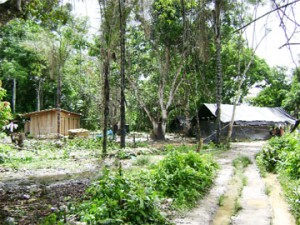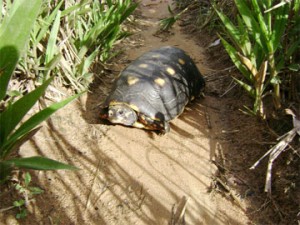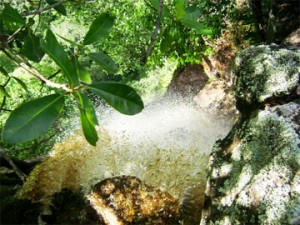There is a saying among many persons who drive through and within Guyana’s interior that meeting a turtle is bad luck. Since these people travel a lot, I believed they must have a reason for saying this, which is why a shiver of dread ran through my body when I met one near Wenamu.
I took false solace when someone else said that it was only bad luck if the turtle crossed my path; not if it was approaching me. The turtle I met was facing me but at an angle. Yet another man said that just meeting any turtle is bad luck. I refused to listen to him. I should have, though that would not have changed anything.
An elderly couple, who lived at Mango Landing on the Wenamu River, had said that there were big dredges — fitted with living quarters, in that river bordering Guyana and Venezuela — brought in by Brazilians who lived on them. They said human and other waste from the dredges was polluting the river. Even though I had not planned to go there, journalistic instinct kicked in and after being assured that the trip could be made in a day, I decided to visit the place. I slid my passport into my bag just in case I happened on a Venezuelan village.
The bad weather of Tuesday morning cleared up in time and we left to go to Mango Landing. Once again, the path was uphill. As we went further, we sometimes walked at the edge of the mountain, with the spectacular views stretching into the distance. Mountain after mountain rolled in an unbroken line, straight into Venezuela. Tiny streams bubbled along and at one point an unseen waterfall tumbled down the mountainside, the roar filling the air.
We reached what appeared to be the end of the path and I stopped. My guide indicated that we had to go down. Villagers had told me about the ‘25 Steps’ that they used to get down the mountain but I never thought that we would be travelling that path.
The tiny path snaked down, hugging the sides of the mountain and after glancing down; I almost decided to cancel the trip, there and then. No protective rails, you just had to hold on to whatever outcrop there was and go down.
After a few quaking seconds, I followed the guide down. A short while later we came to the steepest part and had to navigate between two huge rocks, holding on to two poles that served as rails and then there were the steps; a wooden structure of ten ‘steps’ not 25 but it was steep. Carefully holding on, I crawled down.
As we went on, at times on a little sliver of land, with the steep sides falling deeply away the words of the man at the airport that to get down from Arau would require one to “run downhill for half an hour” came back. As I navigated slick rocks and avoided holes, my shoes came in for compliments, as according to my guide, a number of persons had their shoes practically destroyed while walking on the path. I had just the one pair with me, having recently tossed out another pair after a similar trip to Omai. They were destroyed after I was forced to wade through thick slush.
Beer cans and biscuit wrappings littered parts of the trail. The guide related that at times, to earn money, villagers hauled supplies up the mountain for miners.
After a while, we reached the base of the mountain and ATV trails filled with slush. We traversed through “a short-cut” and over fallen trees that served as bridges over streams, which overflowed when it rained.
Mango Landing
The first indication that we were near Mango Landing came with the loud booming of music permeating the forest, the decibels of which increased as we got closer. At first sight, Mango Landing was a mango tree next to a little thatched hut. The Wenamu River was next to the trail and it was a disappointment. It was high at the time but even so, it was little and did not seem big enough to be a border. There was a canoe in the water.
We walked along the slushy ATV trail and then there was Mango Landing. The striking black tarpaulins that covered the structures that served as living quarters and shops stood out as did the incongruous satellite TV dishes among the many mango trees. Mango Landing had been the scene of a robbery earlier this year, during which two miners were shot. The gunmen had come from Venezuela and walked for miles. Birdman, at the airstrip, had told me that they had passed there and asked for food, but he was suspicious and did not give them anything. He was also smart enough to say that he was expecting company. The men left him alone. They had walked from Kaikan, to the airstrip, then to Mango Landing, where they carried out the robbery and then hopped over to Venezuela. Days later, police there captured them. They were notorious bandits, according to reports.
Enormous garbage bags filled with beer cans stood next to a wooden structure that looked like it housed some latrines. A closer look revealed that there were beds inside. A tall, slim Brazilian girl swept the ground outside.
Music from Brazilian artiste, Pepe Moreno, blasted from a stereo set at the shop; a party was in full swing. About six Brazilian girls cavorted, twisting their hips, and grinding against some miners.
The miner that I had met came over to talk. He had just completed a ‘wash-down’ (a gold strike) and was partying. He boasted to the guide that he had “had” all of the girls during the night. The guide expressed shock when the “price” was disclosed.
The boat operator was among those frolicking and he said that a trip downriver would cost $100,000 and he wasn’t going anywhere anyway. It was explained to me that he was speaking in terms of Bolivars, the currency of Venezuela. There was no other boat. Brazilian programmes blared from a TV nearby and Brazilian nationals watched. There were no Venezuelans.
Guzzling the inevitable Polar beer, the girls danced to Soca music. As their party went on, they began blowing up condoms and hanging them like balloons. Whose birthday was it anyway?
Hungry and with the trip a no-go, I enquired about food. We finally found some at a Brazilian ‘restaurant’. The cost was some $3,000. The Guyana dollar was looked at sceptically before it was accepted. Bolivars were preferred even though their value was lower. Foreign people, foreign languages, foreign music, foreign food, foreign money… it seemed as though I was not in Guyana. It was an uncomfortable feeling.
The rains came and we were forced to wait. The Wenamu river was smaller around the bend and on the Venezuelan side, there was only bush. It looked just like Guyana. At one side, there was a ‘fuel centre’ with drums and drums of fuel that came from Venezuela, where, it was said, it was cheaper than water. At the airstrip I had seen dozens and dozens of drums of fuel.
The miners who were with the Brazilian girls at the other shop left. Then more rain fell. Later a different set of miners came and another party began. The wooden structure that looked like a latrine, but contained beds was not a ‘house of innocence’.

Back up the mountain
When the rain finally ceased, we left. A miner, who said that he was from St Cuthbert’s Mission, came with us, saying that he wanted to climb the mountain but never had a chance. Climbing up was exhausting, it was wet, slippery and very humid. Once at the top, we went to a ledge where we rested for a while and looked at the view.
When we resumed walking, I asked to see the waterfall. We stood at the top and looked at the tumbling water. It was a long way down. Close to the village, we walked along a different path where the cursed creature manifested itself. I normally do not hate turtles. It is only when travelling that they are to be feared.
I halted then went on when I realized it was ‘just a turtle’. I snapped a photo but did not touch it. “Ay, you know that turtle bad luck right, I remember when I meet a turtle pon the road, I din…” Right, this was what I did not need. Another man chimed in that it was only bad luck if the turtle was crossing the road. The turtle was facing us but at an angle. And that raised the question: why did the turtle cross the road?
It was a land turtle. One of the men picked it up and said that the deep indentation at the bottom of the shell showed that it was a male. I refused to touch it. He said it was good eating and walked with it into the village. Once there, it was placed to lie on its back so it could not escape. Another man declared that meeting any turtle was just plain bad luck.
Later that night I spoke with several of the villagers to get their views on the mining situation. The females expressed their concern about prostitution and alcohol. Apparently, Mango Landing was the entertainment spot, and the young men headed there after a ‘wash-down’, sometimes without giving anything to their mothers or wives. Alcohol was a problem too.
A Westlife video played as I made arrangements to leave the next day. I was urged to return for a visit.
The curse of
the turtle
I slept and woke up early, but we could not leave because of the heavy fog. After it had cleared a little, we took a different path. I saw an orange-coloured frog and as we headed up a high hill, heard the drone of a plane. The curse of the turtle had struck. The plane had arrived and we were nowhere near the airstrip. Apparently, the plane had stopped in Eteringbang and when there was a break in the weather, dashed in and out quickly. This was what happened in the rainy season but no one had told me. I gained false hope when as the plane left, I saw that it had a black and not blue underside. I had arrived on a blue and white Air Services Limited plane so I though another one was coming. I was wrong.
Having reached the airstrip in record time after the plane left, I was told that there “might” be another plane the next day as some mines had flooded and some miners were leaving. It was Wednesday and for the first time that week, I saw a newspaper. The headlines left me shocked. They were about Lindo Creek. It was almost too much to comprehend that yet again something like that had happened.
I am not willing to recount the rest of the all too traumatic week. Walking back the 3.6 miles to the village; walking the same distance back to the airstrip the next day; spending the entire day there alternately praying that someone would send a plane, then cursing (in my mind) anyone and everyone. Depressingly heading back to the village, and forcing myself to accept the fact that I would have to be there until Saturday. The village had just one recently established shop, which only sold the most basic goods; it was empty. Utterly convinced that it was the curse of the turtle, which caused all this, I began to hope that it had been soaked in hot, hot pepper and slowly cooked and eaten.
I sent several messages to the newspaper via radio just in case anyone got worried about me. During the rest of the week, I worked on the story, visited the school once again, where they held a graduation ceremony for the children, who were moving up to the secondary school. The deputy chief’s son was one of those and, all dressed up, they were very proud.
This was on Friday and afterwards a party with the ubiquitous Casak started and was supposed to end at six but went past that. The music died then started up somewhere else in the village and continued throughout the night. In the wee cold hours, I heard a strange eerie laugh that went on for about ten minutes. I had never heard anything like it.

Priority
The next morning, I got ready very early, and before breakfast, went for the guide. He apparently could not go without eating but notwithstanding the heavy fog, I couldn’t wait either. I walked alone along the now familiar path that I had traversed so many times.
At the airstrip, we waited for hours for the plane. Two were coming this time as some of the miners were moving out owing to the weather. I spoke to some of them and they said that they helped the villagers. I asked about their mining operations and the environment but they were reluctant to speak. They noted that gold was important to the economy and at almost every point, emphasized the fact that they helped the villagers.
When the plane came, I rushed onto it. It was an airline I had never heard of, Jag’s Aviation. About seven miners boarded too but only four persons were allowed. There was no way that I was leaving that plane and I silently vowed that I would have to be dragged out. That catastrophe was averted when the agent said I was “priority”. I had paid good money to be declared “priority”. Being “priority” was a nice feeling.
We left and flew over a different area. At times we descended, at other time ascended. We were apparently navigating using landmarks on the ground. At a section of what I assumed was the Cuyuni River, swathes of forest were cleared and there were lots and lots of pits. At one section the pits went on for quite a distance in a straight line. A section of the river downstream was discoloured.
By the time we got to Ogle, the turtle was forgotten; a feeling of relief enveloped me. Then I picked up a copy of the Stabroek News; a magistrate had shot a policeman. Maybe it was better in the interior.
Arau has no cows, horses, dogs, cats, sheep or any domesticated animal. It is too mountainous. This means that there are no vehicles either. Communication is limited, only a two-way radio to make contact with the outside world. The area is beautiful, but the people are poor and have a hard life.
I would not be able to survive there. The people are adversely affected by mining and for years, their cries had gone unheard by those who should be responsible. It is one thing to take the word of officials proclaiming that everything is fine, quite another to visit and find out that is not the whole truth. There is some sort of relationship between the locals and the miners, but they fear that this comes at too high a cost.

Their lives have already been forever altered and only time will tell whether there will be a change for the better.








